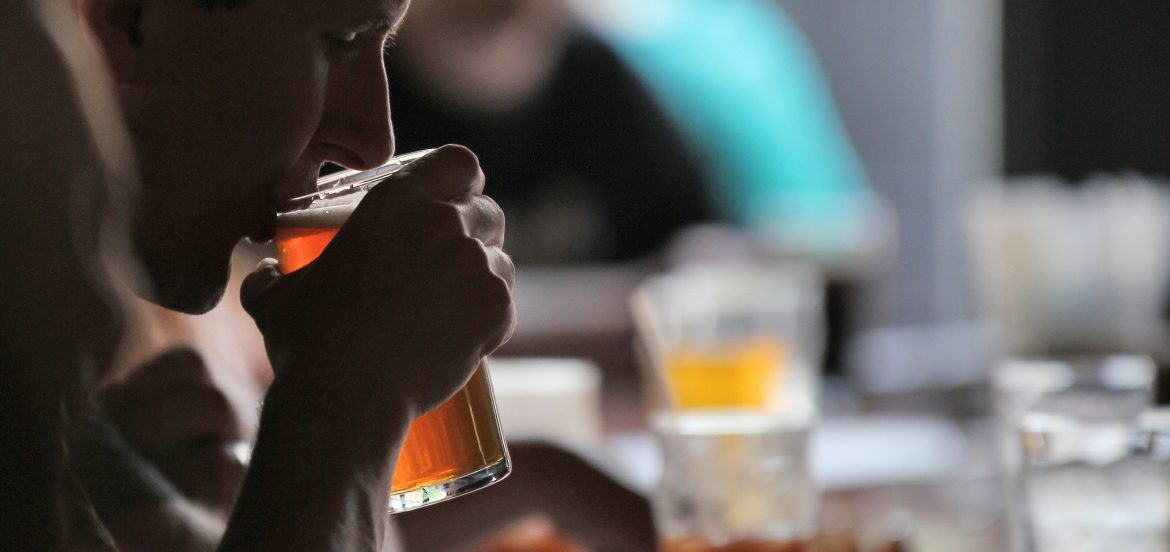
Image: Robert Mathews
By Eric Freedman
Do you like craft beer brewed with water originating in the Great Lakes? What if there are traces of microplastics in your suds?
Researchers from the University of Minnesota and the State University of New York at Fredonia found tiny bits of plastic in 12 brands of beer brewed with municipal water drawn from the Great Lakes.
Three of the local breweries used public water from Lake Superior, four from Lake Michigan, one from Lake Huron, two from Lake Erie and two from Lake Ontario, according to a new study published in the journal PLOS One.
The beer came in aluminum cans or glass bottles and growlers. Most were pilsners.
Fibers accounted for almost all of the 189 particles found in the beer, mostly blue, red/pink and brown. The other particles were plastic fragments
The researchers also tested municipal tap water from seven of the nine communities where the 12 beers were made: Alpena and Holland, Michigan; Chicago and Glenview, Illinois; Buffalo and Clayton, New York; and Duluth, Minnesota. All those samples also tested positive for plastic particles. The other two municipal systems were in the Rochester, New York, area and in Cleveland.
Lead author Mary Kosuth said the research team decided not to identify any of the brands by name because “we did not want to shame any one particular brewery. Rather, we wanted to see if the problem is only showing up in a few brands or if they are showing up in all of them.”
Kosuth and coauthors Sherri Mason and Elizabeth Wattenberg found no correlation between particle levels in any specific brand of beer and in the specific municipal water system it used.
In fact, the highest and lowest particle counts were in two beers brewed in the same community and using the same water supply, the study said, adding, “This indicates that product processing may be integral to understanding anthropogenic (related to or resulting from human influence on nature) contamination.”
The study noted that national brands usually filter their beers more completely, “while locally distributed craft beers may modify or forego this step completely because they feel it affects the overall experience.”
The researchers chose beers brewed from the Great Lakes “because of the known prominence of plastic pollution within those bodies of water.”
“Since multiple toxicity studies indicate risks to human health when plastic particles are ingested, more needs to be known about the present and abundance of anthropogenic particles in human foods and beverages,” they wrote.
The beer analysis was part of a broader study that also looked at microplastics in tap water from 14 countries, including 19 U.S. communities, and in sea salt sold in Minneapolis but originating outside the United States.
“While evidence of plastic pollution in the natural world quickly mounts, few studies focus (on them) in human consumables,” the study said. And a “troubling amount” of debris appeared in the beer, tap water and sea salt, all of which are “common human consumables.”
“Expletives” I’ve been a craft beer consumer before “craft beer” was cool. Trying every new craft beer in every state and community we have visited (when available) and that’s all 50 states with the exception of Hawaii .
Now you’re telling me I’m consuming plastic etc. ?
IPA, stouts, porters, an occasional dark ale, all on the top of my list, then add in some coffee, chocolate, with Nitro once in awhile. (Depends on the maker of the Nitro) .
Craft beer that has gone “national” and maintained the original flavors are my favorite. (I won’t mention them here)
Bottom line? Am I going to stop drinking “craft brew?” I think not. As for the Buds, PBR etc. let us know what you’ve found in their (beer)
It would be nice if the journalists would have provided info on amounts of plastic micro particles and what the established (if any) risk levels are rather than just cutely and inanely asking if we want plastic in our brew.